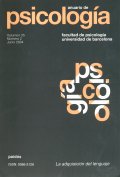The late stages of phonological acquisition: Processes of consonant cluster reduction
Keywords:
Late phonological development, reduction processes, phonological processes, phonematic, phonotactic processes.Abstract
Research on child phonology tends to adopt formal models from linguistics, and to concentrate on the early stages. The present stzldy is an attempt to establish the later stages in the development of phonology, and to explain them from a psychological and pragmatic perspective based on the paradigm of phonological processes. We considered both phonematic and phonotactic processes, but we focused on consonant cluster reduction as the process that is most representative of late phonology. Spontaneous speech samples were recorded from 240 Spanish-speaking children (120 girls/l20 boys) divided into six age groups ranging from 3;O to 5;11 years. We obtained a large corpus of errors and codified them in terms of the corresponding processes. The results show a significant age-related decrease in the frequency of the processes. Three stages can be observed in the acquisition of phonology during the period studied: expansion, stabilization and resolution. Age four is a decisive milestone in the acquisition of phonology, as previous research in several languages has repeatedly pointed out. Our data strongly support universal trends in the acquisition of phonology, although it is accornplished through different individual paths. Analysis of the mechanisms underlying phonological processes provides a tentative explanation of phonological development in the context of emergent knowledge. Implications for articulation versus knowledgebased intervention in speech disorders are also discussed.
Downloads
Published
2004-01-12
Issue
Section
Estudios
License
The authors who publish in this journal agree to the following terms:
Authors transfer to the publisher all copyright for the full term of protection and for all the world.
The authors can post a copy of their articles in accordance with the policy of free access to the journal.


